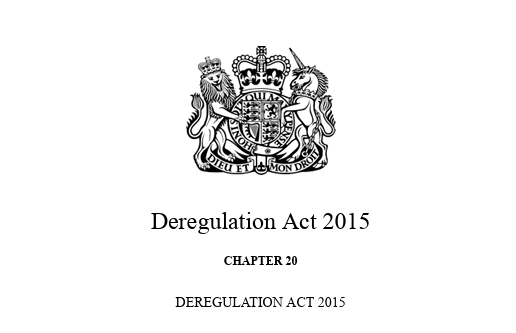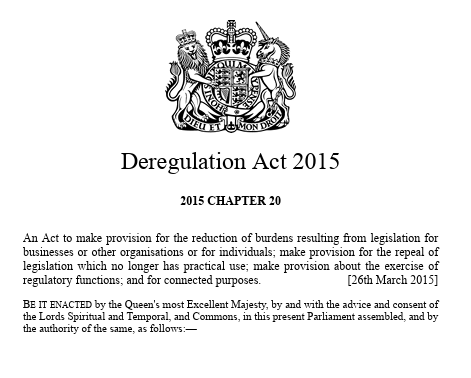
When the Deregulation Act became law in 2015, it received little attention outside government and legal circles. At the time, it was seen as a technical exercise to reduce bureaucracy and tidy up the statute book. Yet a decade later, this Act is proving to be one of the most significant pieces of legislation for modern business regulation.
For industries such as cannabis and hemp, which often face complex and overlapping rules, the Deregulation Act 2015 provides both a foundation and a renewed opportunity for reform. With the Government now strengthening the “Growth Duty” that sits at the heart of this law, the principles behind the Act are more relevant than ever.

A Law Designed to Simplify and Enable
The Deregulation Act 2015 was introduced by the coalition government to reduce unnecessary regulatory burdens on businesses, organisations and individuals. Its aim was to make it easier to operate and innovate without compromising essential public, consumer or environmental protections.
The Act covered a broad range of subjects, from transport and housing to apprenticeships and licensing. However, for business and industry, its most lasting contribution was the introduction of the Growth Duty.
This duty requires certain regulators to “have regard to the desirability of promoting economic growth” when carrying out their functions. In simple terms, it means regulators must think carefully about how their actions affect the ability of legitimate businesses to grow, invest and create jobs.
What the Growth Duty Means in Practice
The Growth Duty came into effect in 2017 and applies to a wide range of regulators, including the Environment Agency, the Health and Safety Executive, and the Food Standards Agency.
In practice, it means that regulators should act proportionately, engage constructively with businesses, and avoid creating unnecessary barriers to enterprise. They are expected to make their processes transparent, predictable and efficient while balancing economic outcomes with the protection of people and the environment.
The duty does not ask regulators to prioritise growth above everything else. Instead, it recognises that economic development and public protection can and should exist side by side.
Why It Matters to Cannabis and Hemp
The UK’s cannabis and hemp industries are governed by a complex web of regulation that involves several different departments and agencies. These include the Home Office, MHRA, FSA, VMD, DEFRA and HMRC. Each has a distinct remit, yet their roles often overlap, creating duplication and delay.
Industrial hemp growers, CBD manufacturers and medicinal cannabis operators all encounter regulatory barriers that are not only time-consuming but also inconsistent across agencies. A single product or licence application might require multiple submissions and approvals from different bodies, each interpreting rules in its own way.
This is exactly the kind of inefficiency that the Deregulation Act was designed to challenge.
By reminding regulators of their legal obligation to consider growth, the CTA and its members can make a strong case for regulation that is proportionate, risk-based and fit for purpose. The Growth Duty provides a framework for arguing that businesses working legally and responsibly should not face unnecessary obstacles to innovation and expansion.
The Government’s Renewed Focus on Growth
The Deregulation Act has gained fresh attention following the Government’s announcement in October 2025 that growth will be placed at the centre of the UK’s regulatory system. This initiative strengthens the Growth Duty introduced by the 2015 Act and introduces new tools to hold regulators to account.
The Department for Business and Trade (DBT) will introduce a public dashboard that publishes regulator performance data on GOV.UK. Independent reviews will be carried out more frequently to assess how well regulators balance their duties. Businesses will be invited to provide feedback on how regulation affects their operations. A new Regulators Council will also be established, bringing ministers and regulator heads together to coordinate strategy and share best practice.
For the cannabis and hemp sectors, these reforms could have a significant impact. They provide a mechanism to highlight delays, duplication and missed opportunities in the current regulatory structure. By bringing transparency and data into the discussion, it will be easier to identify where change is most urgently needed.
A Foundation for Smarter Regulation
The Deregulation Act is not about removing rules altogether. It is about improving the quality of regulation so that it supports innovation while maintaining high standards of protection.
For the cannabis and hemp industries, this principle is crucial. The goal is not to deregulate but to modernise. A modern system would distinguish between low-risk and high-risk activities, ensure consistency across departments, and make compliance achievable for legitimate businesses.
The CTA has long called for the creation of a Cannabis Office to act as a single point of coordination for licensing and compliance. Such a body would reduce duplication, align decision-making and provide a clear route for communication between government and industry. The spirit of the Deregulation Act supports this idea by encouraging collaboration between departments and accountability for how regulation affects growth.
Growth with Integrity
Some critics of the Deregulation Act have expressed concern that focusing on growth might lead to weaker protections. The statutory guidance makes clear that this is not the case. Regulators are still required to enforce the law robustly and safeguard public health and safety, but they must do so in a way that supports sustainable economic progress.
This balanced approach reflects the CTA’s position that growth and responsibility go hand in hand. Through its compliance and training programmes, the Association continues to promote best practice in marketing, labelling and testing. These efforts ensure that businesses operate transparently and that consumers can have confidence in the products they buy.
Marika Graham-Woods, Managing Director of the CTA, summed it up clearly:
“Responsible businesses are not asking for deregulation. They are asking for proportionate regulation that supports innovation while maintaining standards. The Deregulation Act reminds everyone that regulation should work with progress, not against it.”
Looking Ahead
Ten years after it was passed, the Deregulation Act 2015 remains one of the most relevant pieces of legislation for industries that need both regulation and room to grow. Its principles underpin the Government’s current reform agenda and provide a legal foundation for more balanced, transparent and efficient oversight.
For the cannabis and hemp sectors, this is an opportunity to lead by example. By working collaboratively with regulators, presenting credible data and demonstrating responsible practice, the industry can show that growth and compliance are not competing goals but complementary ones.
The message is simple. Regulation and enterprise can coexist. The Deregulation Act provides the framework, and the strengthened Growth Duty gives it new momentum.





